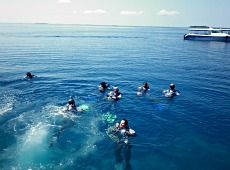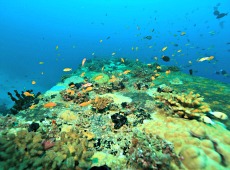Eco-friendly resort Angsana Ihuru hosted a 24 hour scuba diving event to mark the 14th anniversary of its Rannamaari shipwreck and highlight the importance of protecting coral and marine life in the Maldives.
Seventy people representing 12 nationalities – including scuba divers representing all levels of experience, underwater photo journalists, and guests – participated in the “10 to 10 Rannamaari wreck” event, kicked off April 25.
A total of 138 dives and a 24-hour live webcast broadcast worldwide showcased the extraordinary marine diversity and beauty of the Maldives as well as the unique ecosystem that has developed on the shipwreck.
“The Maldives is well known for its natural beauty and among the island resorts Ansana Ihuru in particular is known for its beautiful house reef. The resort was renovated last year and attention was focused on the Marine Centre, because it is the underwater beauty we’d like to share,” said Executive Assistant Manager Henar Rios at the event’s opening ceremony.
The resort boasts of having one of the best ‘house reefs’ in the Maldives. “Seventy-five percent of Angsana Ihuru’s beauty is underwater,” Rios told Minivan News. She further explained that the resort has a 30 percent guest return rate, whereas most resorts average only five percent, even with special incentive programs in place.
“The Rannamaari wreck is now a living structure and symbol which is an extension of our reef that we will protect and share with pride,” Rios added.
The Rannamaari wreck was previously used as a dredging ship on a nearby island and was towed to Angsana Ihuru in 1999 to be used as an artificial reef. However, the ship sank “mysteriously” several days before the planned event and has since become a home for thousands of sea creatures and corals at a depth of 28 metres.
 Scuba divers immediately took to the water to explore the reef following the open ceremony, which included a traditional bodu beru (drumming) performance and kurumba (tender coconut) refreshments.
Scuba divers immediately took to the water to explore the reef following the open ceremony, which included a traditional bodu beru (drumming) performance and kurumba (tender coconut) refreshments.
Throughout the day divers and snorkelers were rotating in and out the water, exploring the Rannamaari wreck just off-shore from both the Marine Centre and Velaavani (shallow bay) Bar.
In addition to the daytime dives, a variety of unique scuba experiences took place to highlight the marine environment’s astounding changes which occur daily, including the “before dusk”, “fluorescent” underwater life, midnight, and “before dawn” dives.
A “try scuba” opportunity catered to non-certified divers, with Angsana Ihuru’s professional dive instructors carefully facilitating participants’ first underwater breathing experience in the island’s shallow lagoon.
The Rannamaari Play was a highlight of the anniversary celebration events. Resort staff creatively recounted the historical Maldivian folklore tale through a shadow-theatre performance accompanied by music and narration.
The sea demon Rannamaari previously terrorized the Maldivian people by demanding the sacrifice of a virgin girl each full moon. However, the Maldivians were saved by a Muslim traveler, who disguised himself as a women and stayed overnight in the temple reading verses of the Quran, causing Rannamaari to disappear forever. Following the traveler’s victory over the demon, the Maldives embraced Islam as a nation in 1153 AD.
Immediately following the play, the Male’-based band Flower Rain provided guests with live music at the bar.
Throughout the day’s events resort’s staff provided an assortment of delicious refreshments – including traditional Maldivian ‘short eats’ – to guests and participants, demonstrating the resort’s genuine hospitality.
In line with Angsana Ihuru’s environmental conservation focus, five percent of earnings generated from the anniversary events dives will be donated to sister-company Banyan Tree’s Green Imperative Fund, which supports community and environmental projects around the world.
The Maldivian telecommunications company Wataniya sponsored the “10 to 10 Rannamaari wreck” event.
“Unique, dive centric resort”
“The highlight of the event was the spirit that was shown by the staff of the island and the in house guests. Plus the online users who kept the momentum going,” the Marine Centre Manager and dive base leader for both Angsana Ihuru and Banyantree Maldives Vabbinfaru Adam Rasheed told Minivan News.
“The Rannamaari wreck is unique because you can swim in simply. It is very close to the reef, which means more or less all levels of divers, even a person who is in the water for the first time, will have a chance to see this.
“Now the wreck is like an artificial reef. The fish life is very, very good and very special, not to mention so easy to access,” Rasheed said.
so easy to access,” Rasheed said.
Average underwater visibility peaks at 30 meters, while the reef drops away gradually from the powder-white sandy shoreline.
Rasheed explained that the initial idea for the “10 to 10 Rannamaari wreck” event came to him during a night dive.
“The dive was really, really good and I wondered when will two of the most important people in my life – my mom and aunt – get the chance to see something like this? So we started to build on that idea to also reflect the reopening of the resort following last year’s renovations, as well as commemorate the 14th anniversary of the wreck,” Rasheed said.
“Angsana Ihuru is trying to do something unique with more of a focus on the water and divers, to position ourselves as a dive centric resort.
“Over the years Ihuru has had an environmental focus and so we wanted to complement this and take the concept to a new level,” he added.
Rasheed further explained that during the recent renovations, the entire dive center structure was changed to reflect the resort’s focus on the underwater environment, diving, and snorkeling.
Angsana Ihuru claims to be the first resort in the Maldives to offer SNUBA, where breathing air is supplied from a long hose that is connected to a floating raft on the surface, allowing guests to dive up to six metres.
“For those who prefer snorkelling or are new to scuba diving, this gives a feel for diving without the need for deep underwater submersion.”
A plethora of marine life frequents the vibrant coral reef surrounding the resort island, including giant moray eels, scorpion fish, stingrays, eagle rays, manta rays, batfish, nurse sharks, big jack fish, and sea turtles.
Pictures and videos from the “10 to 10 Rannamaari wreck” event can be found on the Ihuru Funa Facebook or Twitter pages.